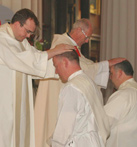Training and Formation
Preparation for priesthood takes place at a Seminary, or college where future priests receive their formal training. The seminary provides spiritual, academic and pastoral formation, helping the student to grow in holiness, commitment to Christ and care of His people. It also offers an opportunity to grow in the human virtues, being a community of people with similar ideals, aims and objectives who not only live, pray, work and study together, but share cultural, recreational and sporting pursuits.
While at the seminary, the student follows a recognised course in philosophy, theology, scripture and other subjects. He is given the opportunity to undertake pastoral work, gaining first-hand experience of the priestly life by living and working in a parish. After completing his initial theological study the candidate is ordained as a deacon. He may then be assigned to work in a parish for a year before his priestly ordination.
Seminary formation has as its aim the preparation of the candidate for the responsibilities of priestly ministry. These are summed up on his ordination day when the candidate is asked three specific questions which he must answer freely and without reservation:
Are you resolved to exercise the ministry of the word worthily and wisely; preaching the Gospel, and explaining the Catholic faith?
The ordinand will have spent several years in serious and sustained study of the Word of God in the Scriptures, of how it is developed and understood in the teaching and life of the Church, and of how to apply it to the circumstances of today. He will have learnt the techniques of teaching and preaching.
Are you resolved, with the help of the Holy Spirit, to discharge without fail the office of the priesthood in the presbyteral order as a conscientious fellow-worker with the bishops in caring for the Lord’s flock?
To care for the Lord’s flock, the priest must know the people, their varied needs, and the reality of joy and suffering in their lives. Through his pastoral projects he will have visited and worked with the sick, the elderly and the lonely both in hospitals and at home; he will also have worked with those with disabilities; with children in primary and secondary schools, with youth groups, and with the ordinary people of God in their own homes.
Are you resolved to consecrate your lives to God for the salvation of his people and to unite yourself more closely every day to Christ the High Priest, who offered himself for us to the Father as a perfect sacrifice.
The ordinand commits himself to a life of prayer through which he will grow to know Christ better and be ever more aware of the presence and guidance of the Holy Spirit in his life. Spiritual direction, regular confession, as well as retreats and times of prayer and reflection, will be the vital under-pinning of all his endeavours.
Acceptance for Formation
In Dublin the Archbishop’s decision about whether or not to accept a candidate is based on the recommendations he receives from the Episcopal vicar for priests and the director of vocations. After a period of discernment with the vocations director, a decision is then made whether or not to make a formal application. The applicant is then asked to undergo a psychological assessment. The assessment is to provide clarity on an applicant’s strengths and limitations, so that the formation programme can be geared to foster his unique and his personal maturity in the service of the gospel. Finally the applicant is asked to attend an interview panel. The Archbishop receives advice from this panel.
Qualities Required for Acceptance
Those over the age of 18 may be accepted for formation.
When a person is being assessed as to his suitability for priesthood a holistic approach is taken. A person’s gifts, talents and commitment to their faith are all taken into account. A person who is suitable for priesthood should have an ability to get on with people, and be willing and open to learn more about himself and the world around him. We do not judge a person solely on academic abilities alone. Over all this the person called to priesthood is one whose faith in God most important, a faith that is growing and willing to show itself in their day-to-day life.
Younger men, under the age of 18, who feel they may have a priestly vocation are encouraged to keep in contact with the diocesan vocations director while continuing their studies at school and being actively involved in local parish life. They are also encouraged to attend diocesan Vocations events.




